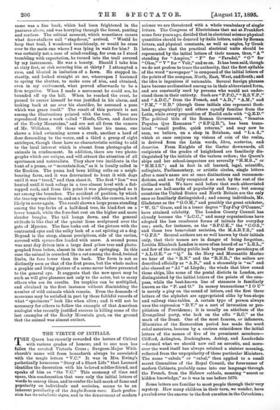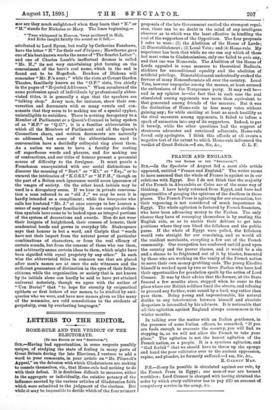THE VIRTUE OF INITIALS.
THE Queen has recently rewarded the heroes of Chitral with various grades of honour, and to one man has fallen the coveted Victoria Cross ; Surgeon-Major Whit- church's name will from henceforth always be associated with the magic letters " V.C." It was in Mrs. Ewing's pathetically humorous "Story of a Short Life" that Leonard identifies the decoration with his beloved soldier-friend, and speaks of him as "the V.C." This economy of time and space, this condensation that uses only the initial letters of words to convey ideas, and to confer the hall-mark of fame and popularity on individuals and societies, seems to be an inherent peculiarity of the Anglo-Saxon race. Each profes- sion has its cabalistic signs, and in the department of modern
science we are threatened with a whole vocabulary of single letters. The Congress of Electricians that sat at Frankfort- some four years ago, decided that in electrical science physical quantities should be denoted by italic letters, units by Roman letters, and physical constants, as well as angles, by Greek letters ; also that the practical electrical units should be represented by the initial letters of their names, thus, "A" standing for "Ampere," " F " for "Faradel," " 0 " for " Ohm," " V " for " Volt," and so on. It has been said, though we do not profess to trace the authority, that the first syllable- of the word " newspaper " is composed of the initial letters of the points of the compass, North, East, West, and South; and the idea is ingenious if untenable. Several foreign phrases. have become acclimatised among us in their abbreviated form, and are constantly used by persons who would not under- stand them in their entirety. Such are "P.P.C.," " and " A.D.C.," from the French, and "A.D.," "A.M.," and. "P.M.," "N.B." (though these initials also represent Scot- land geographically) and others equally familiar from the Latin, while every proposition of Euclid ends with " Q.E.D."' The political title of the Roman Government, " Senatus- Populus Que Romanus " (" S.P.Q.R."), has been trans- lated "small profits, quick returns," and may now be seen, we believe, on a shop in Brixham, and "L s.
which at once conjures up visions of coin of the realm,. is derived from the Latin words, libra, sextarius, and denarius. From Knights of the Garter downwards, all- recipients of the grades of knighthood are familiarly dis- tinguished by the initials of the various orders ; the Queen's- ships and her school-inspectors are severally "H.M.S..," or- " H.M.I.S." ; and in fact in all learned, legal, scientific,. collegiate, Parliamentary, or artistic circles, single letters- after a man's name are at once distinctions and recommen- dations, and are fully recognised as such by the rest of the civilised world. We have said before that such abbreviated forms are hall-marks of popularity and fame ; but among- countries the United States and North Britain are the only ones so familiarly distinguished ; and among individuals, Mr. Gladstone as the " G.O.M.," and possibly the great cricketer,. " W. G." Grace, and in a lesser degree " Tay-Pay O'Connor,' have attained celebrity. The London County Council has already become the " L.C.C.," and many organisations have adopted the less cumbrous forms of initials for everyday use ; such, for instance, as the " S.P.C.K.," the " and those two benevolent societies, the M.A.B.Y.S.," and " G.F.S." Several authors are so well known by their initials only, that their names are in danger of being forgotten_ Lcetitia Elizabeth Landon is more often heard of as " L.E.L.," and few of the reading public look beyond the pseudonym of " A.L.O.E." or " Q." In the Navy and Mercantile Marine we hear of the " R.N." and the "R.N.R.," the sailors are described officially as " A.B.," and a steamship is "as." and. also classed as "Al" at Lloyds ; the winds that blow round, those ships, like some of the postal disticts in London, are distinguished by the initial letters of the points of the com- pass, while the best-known line of steamers is familiarly known as the " P. and 0." In money transactions " I 0 II "' is merely a play on the sound of letters, and the first three letters of the alphabet are appropriated alike by bun-shops and railway time-tables. A certain type of person always• uses the expression " D.V." as a sort of invocation or pro- pitiation of Providence ; it is usually an attribute of the Evangelical party, who look on the of " R.C." as the mark of the Beast. One of the most famous, or infamous,. Ministries of the Restoration period has made the word- cabal notorious, because by a curious coincidence the initial letters of the names of five of its prominent members— Clifford, Arlington, Buckingham, Ashley, and Lauderdale —formed what we should now call an acrostic, and more- over the word itself has always retained a sinister meaning, reflected from the unpopularity of those particular Ministers.. Thename " cabala " or "cabal," then applied to a small secret Committee of the Royal Council, the forerunner of modern Cabinets, probably came into our language through the French, from the Hebrew cabbala, meaning "secret or- hidden knowledge," as it was in use before 1670.
Some letters are familiar to most people through their very mystery. How many children in their turn, we wonder, have puzzled over the answer to the first question in the Catechism; nor are they mach enlightened when they learn that " N." or • 'M." stands for Nicholas or Mary. The lines beginning,-
"'Twas whispered in Heaven, 'twas muttered in Hell, And Echo caught faintly the sound as it fell,— attributed to Lord Byron, but really by Catherine Fanshawe, have the letter " H " for their mot d'enigme ; Hawthorne gave one of his best-known works the name of "The Scarlet Letter "; and one of Charles Lamb's ineffectual dramas is called "Mr. H.," its not very entertaining plot turning on the -concealment of the hero's real name, which in the end is found out to be Hogsflesh. Readers of Dickens will remember "Mr. F.'s aunt ; " while the riots at Covent Garden Theatre, familiarly known as the " 0.P." riots, live chiefly in the pages of "Rejected Addresses." When members of the same profession speak of individuals by professionally abbre- viated titles, it is generally a sign that the speakers are -"talking shop." Army men, for instance, strew their con- versation and documents with so many vowels and con- sonants that they seem to be making use of a special cypher, unintelligible to outsiders. There is nothing derogatory to a Member of Parliament or a Queen's Counsel in being spoken of as "M.P." or " Q.C." ; it is a familiar abbreviation in which all the Members of Parliament and all the Queen's Counsellors share, and written documents are naturally so addressed, but some of the abbreviations used in -conversation have a decidedly colloquial ring about them. As a nation we seem to have a faculty for casting off superfluous words and phrases, and for making use of contractions, and our titles of honour present a perennial source of difficulty to the foreigner. It must puzzle a Frenchman unacquainted with our social distinctions to discover the meaning of "Bart." or "Kt." or "Esq.," or to unravel the intricacies of " K.C.S I." or " M.F.H.," though on the part of a Briton such ignorance would mean ignorance of the usages of society. On the other hand, initials may be used in a derogatory sense. If we hear in private conversa- tion a man referred to as "old J.," we may be sure it is hardly intended as a compliment ; while the bourgeoise who calls her husband "Mr. J." at once conveys to her hearers a sense of easy and vulgar familiarity. In our complex civilisa- tion symbols have come to be looked upon as integral portions of the system of decorations and awards. Men do not wear their insignia of knighthood, their crosses of honour, their academical hoods and gowns in everyday life. Shakespeare says that honour is but a word, and Carlyle that "words have not their import from the natural power of particular combinations of characters, or from the real efficacy of ,certain sounds, but from the consent of those who use them, and arbitrarily annex certain ideas to them, which might have been signified with equal propriety by any other." In such wise the abbreviated titles in common use that are placed after men's names are at once the sole witnesses and the sufficient guarantees of distinction in the eyes of their fellow- -citizens, while the organisation or society that is not known by its initials alone can hardly be said to have yet attained universal notoriety, though we agree with the author of 4‘ Urn Burial " that " to hope for eternity by enigmatical epithets or first letters of our names, to be studied by anti- quaries who we were, and have new names given us like many of the mummies, are cold consolations to the students of perpetuity, even by everlasting languages."



































 Previous page
Previous page